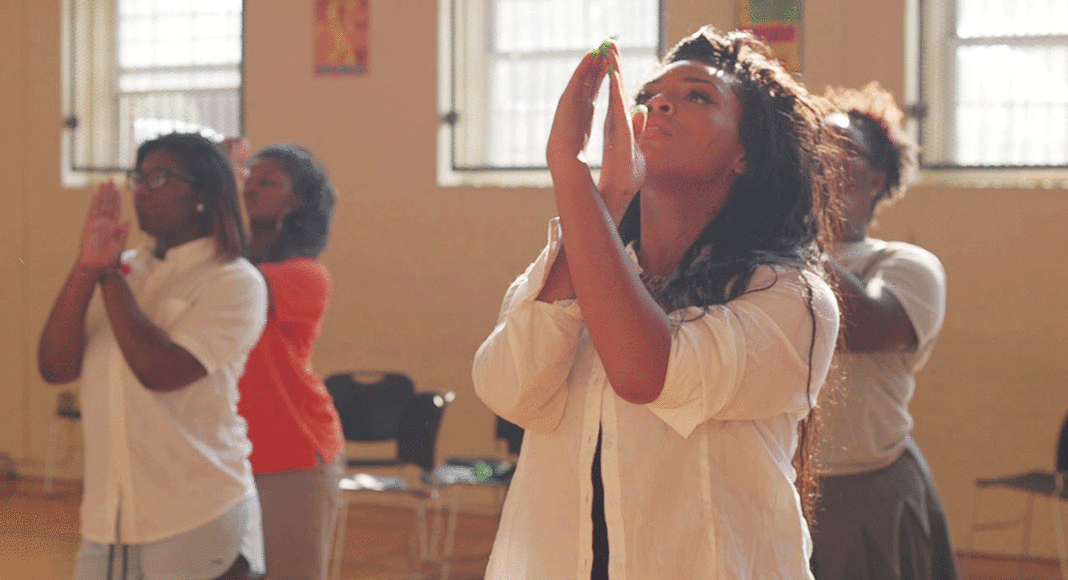While a certain temporary resident of the White House and his cronies are doing everything they can to undermine and defund educational opportunities, along comes a movie like Step to explain in vivid terms how education can transform lives, families, and communities. This engrossing documentary examines the stakes for three young black women, high school seniors from inner-city Baltimore, as they strive to be the first members of their families to go to college.
The subject is serious, but the mood of the film is affirmative and joyful. Director Amanda Lipitz filters the academic story through the girls’ experiences on the school step team—the percussive, foot-stomping, hand-clapping, synchronized dance drills that are so integral to these girls’ lives. Step is “making music with our bodies,” as one team member says. Or, more simply, “Step is life!”
We find out right off the bat that this is no ordinary school. The Baltimore Leadership School for Young Women is a charter school established for the sole purpose of shepherding its 120 female students through the educational system and into college. Lipitz’s film begins in the fall of 2015, as the members of what will be the school’s first graduating class begin their senior year. The school takes students from grades six through 12, and Lipitz spotlights three girls who have been there since the start.
Blessin Giraldo founded the step team back in the sixth grade. Bright, charismatic, and brimming with personality, she’s a demon on the step floor. But she’s so used to coasting by on charm, she’s let her grades slide, and her future is in jeopardy. Cori Grainger calls herself an introvert (“I’m everything that step is not,” she jokes), but says “those parts come out of me when I step.” Her grades are terrific, and she dreams of going to Johns Hopkins University—if her mom and recently-laid-off step-father can pay for it.
Tayla Solomon is the daughter of a Baltimore policewoman who loves to come to step rehearsals and cheer on the team. Although her exuberance often embarrasses Tayla, her mom is wholeheartedly committed to the program as a way for girls who she says are “lost” to succeed. Also prominent in the film is the new, no-nonsense step coach, “Coach G,” and tough-love counselor Paula Dofat, who instills the motto, “No excuses,” into her girls’ lives.
As the girls apply for college admissions and financial aid, while rehearsing for their last big Baltimore step competition, they cope with family dynamics and challenges like empty refrigerators and power outages. Director Lipitz sets their story in the context of the police shooting of Freddie Gray, which happened in the girls’ junior year, portraying both the volatility of their urban life, and the infectious joy of their solidarity as they study and step their way to survival.
Lipitz is in a unique position to tell this story. A Baltimore native whose activist mother was instrumental in helping to found BLSYW in 2009, she has known these girls since they were 11 years old and watched them grow up. Her unprecedented access to these students, their families, and the administrators determined to get them to move forward in their lives, make the movie at once more relaxed, and yet more urgent than if a dispassionate stranger were telling their story.
In a pre-credit prologue at the beginning of the film, a quartet of its stars appear onscreen to welcome the audience. “Our goal is to turn this film into a movement,” they tell us. We all know the result when doors of opportunity are slammed shut. Step reminds us what can be achieved when “a group of powerful women come together” to succeed.
STEP
*** (out of four)
With Blessin Giraldo, Cori Grainger, Tayla Solomon, Gari McIntyre, Paula Dofat. Directed by Amanda Lipitz. A Fox Searchlight release.
Rated PG. 83 minutes.














